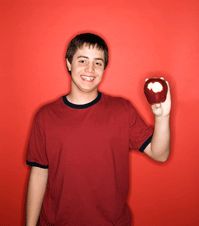|
|
|
|
 |
|
|
 |
38번:일반 동사의 과거형
|
 |
|
|
무제 문서
|
 |
 |
|
 |
|
수업을 시작하기 전에, 다음 표현들을 활용하여 선생님과 간단히 인사를 나누어 보세요. |
| Before starting today’s lesson, first greet your student using the expressions below. |
|
 |
|
|
 |
| 1) Hi 안녕하세요? |
| 2) Glad to meet you 만나서 반갑습니다. |
| 3) Glad to meet you, too. 저도 만나서 반갑습니다. |
|
 |
|
|
 |
|
|
 |
 |
|
 |
|
다음은 오늘 수업에서 배울 내용들입니다. 강사님의 지시에 따라 함께 발음 연습을 하면서 그 뜻을 익혀보세요. “Repeat after me”라는 말이 나오면, 강사님의 말을 따라 하세요. 4번 반복하게 됩니다. |
| Help your student learn today’s expressions below by letting him or her repeat after you four times. |
|
 |
|
|
 |
| 주제:행동이나 작용을 나타내는 말 (Topic: Use of Verbs I) |
|
I/You
나는/당신은 |
wanted/needed/loved/liked
원했습니다/필요했습니다/사랑했습니다/좋아했습니다
|
an apple.
사과를 |
They
그들은 |
rice.
쌀(밥)
|
He/She
그는/그녀는 |
a banana.
바나나를 |
|
|
I/You
나는/당신은 |
met/saw/knew
만났습니다/보았습니다/알았습니다
|
him/her/them/Peter
그를/그녀를/그들을/피터를
|
They
그들은 |
He/She
그는/그녀는 |
|
|
 |
|
|
 |
|
|
 |
 |
|
 |
|
다음은 오늘 수업에서 배운 내용이 실제 어떻게 대화에서 사용되는지 연습해 보도록 합니다. 강사님이 대화를 시작한 이후, 본인의 차례에 맞는 대화를 만들어 보세요. 대화가 끝나면 역할을 바꾸어 연습해보세요. |
| Use role-playing to help your student practice what he or she learned today. You will play Tom in the dialogue below. Later, change roles with your student and try the dialogue again. |
|
 |
|
|
 |
| 상황 (Situation) |
: 친구와 짧은 대화를 나누어 보세요.
(The situation is that your student talksto his or her friend.) |
|
Tom: You wanted an apple.
_____: Yes. I wanted __________ .
Tom: You ate rice.
_____: No. I ate _________.
Tom: He loved ________________ .
_____ : Yes. He ______________ a banana.
Tom: He ___________________________
______ : No. He saw a car. ?
Tom: They liked ______________.
________ : Yes. They ______________. |
 |
|
 |
|
|
 |
|
|
|
|
 |
 |
|
 |
|
오늘의 수업이 끝났습니다. 수업을 끝내기 전에, 강사님께서 오늘 배운 내용에 관해 몇 가지 질문을 하시면 이에 답해 보세요. 그리고, 강사님께 작별 인사를 아래 표현을 이용해서 해보세요. |
| Review today’s lesson by giving a little quiz with three or four questions. Then, close today’s lesson by using the expressions below. |
|
 |
|
|
 |
1) Thank you 감사합니다.
2) Good night 잘 자요. |
|
|
 |
|
|
 |
|
|
|
|
|
| |
|
|
 |
|
|
|
|
|
|